Reviews
Louis Malle
France / West Germany / Italy, 1974
Credits
Review by Glenn Heath Jr.
Posted on 25 November 2010
Source Criterion Collection DVD
Categories Malle Entendu: The Ecstatic, Eclectic Cinema of Louis Malle
Although they populate different cinematic universes, François Truffaut’s iconic troublemaker Antoine Doniel and Louis Malle’s reserved Nazi sympathizer Lucien Lacombe in Lacombe, Lucien are both byproducts of modern French institutions gone awry. For each boy, traditional family dynamics permanently fracture, sending them into the cold, manipulative adult world looking for a sense of identity and place. The small traumas of environment often push them from one misguided interaction to the next, creating an erosive pattern of failed realizations and fulfillments. This approach contextualizes their characters within specific political and social stigmas hounding France during the 1940s and 50s. However, one grave difference separates the emotional and ideological confusion of Antoine and Lucien: temporality. The sense of prolonged duration, in committing and recovering from mistakes, learning lessons, and getting second chances, ultimately makes Truffaut’s series a hopeful and sublime coming-of-age epic. The lack of time, and in turn the luxury of a learning curve, situates Lacombe, Lucien as an incisive tragedy. Antoine gets decades and multiple changes in style to figure out his personality and calling, but Lucien exists in a rigid historical timeline where minutes, hours, and days compress to formulate a crushing sense of imminent fatality.
Malle begins Lacombe, Lucien with a fairytale-like introduction: “A small town in the Southwest of France, summer of 1944.” Not only does this clearly define the film’s time and space (Nazi occupied France, Vichy Government, French Underground), it gives the story a lucid, lyrical tone that complicates classic characterizations of good and evil. Played by Pierre Blaise, Lucien works tirelessly in a rest home, mopping the floors and emptying the bedpans for dozens of elderly occupants. But Malle immediately establishes how quickly Lucien’s intent can change from compassionate to destructive. Upon hearing the tender song of a bird from beyond the open window, Lucien takes out his slingshot and shoots it dead. He looks at the lifeless body on the ground, then continues with the work at hand, his expression never changing from restrained indifference. When Malle cuts to the film’s credit sequence of Lucien riding his bike through the poetic green countryside, it’s clear Lacombe, Lucien will be a film about shifts in perception and tone, and the push-pull between action and consequence, entirely framed within the burgeoning transition of a landscape under siege.
Lucien drifts through the world like a wordless cipher, aware of the fragility of his surroundings but completely unable to discern the finite human value of place. His stone-faced demeanor only changes when provoked by authority figures attempting to control his actions, as when Lucien returns home to find his mother shacked up with a local farmer while his father remains a prisoner of war. Malle emphasizes Lucien’s inconsistent reactions to his environment during these early scenes in the country, specifically in regards to his relationship with animals. Lucien hunts rabbits with a massive shotgun, snaps the head off a chicken with a few swipes of his hand, but also holds the head of a dying horse as its massive body is dragged onto a cart. Malle shows us kindness and maliciousness unabashedly standing side-by-side, and this juxtaposition will inhabit each of Lucien’s grave decisions throughout the film.
Identity and belonging become Lucien’s driving ambitions as he approaches the leader of the local underground to join the French resistance against the Nazis. “We have too many boys like you,” the man says, and Lucien’s face never flinches from its usual expression of coldness. The causal dismissal obviously injures Lucien’s pride, but you’d never know it from Malle’s disavowal of grandiose emotional moments. Instead, Lucien travels back to the city and winds up in the arms of the welcoming German Police, a hotbed of charming vipers who are dressed like 1930’s gangsters in flashy suits and fedora hats. The collective of diverse personalities, which includes a French movie actress, a cycling champion, and a German assassin, languishes in a wealthy French mansion when they’re not hunting down Jews or defectors with effortless precision. The glamorous mise-en-scene, with its textured walls, lavish furniture, and colorful designs, overshadows the characters’ roles as killers. When the French actress states, “I don’t care who wins the war,” it’s clear she’d rather be in perpetual party mode than investing in the war effort.
The first night, Lucien gets drunk and eagerly spills his knowledge of local enemies of the state, giving them the name of the rebel leader he met in the previous scene. It’s just another about-face for an enigmatic youth desperately grasping at emotional straws, and its ramifications are inferred only through a disjointed moment of torture heard resonating from the upstairs wing of the mansion. As Lucien passes the slightly ajar door, the image of the partisan’s head being dipped into a tub of water only holds his attention for a few moments before the boy moves on down the hallway to another realm of focus. Lucien becomes a permanent fixture in the Gestapo’s operations, donning the stylistic fatigues and wielding a gun as if he was born with one in his hand.
Malle complicates Lucien’s character even more when he introduces a Jewish tailor named Albert Horn and his beautiful young daughter France. Like with the Gestapo, Lucien is drawn to this family despite the obvious contradictions in ideology and situation, visiting their house often much to their chagrin. He commands their small dining room by standing upright and staring into Albert and France’s eyes, waiting for them to respect his role as a powerful man. But the Horns have bigger problems than Lucien, and they almost put up with the teen simply out of necessity. Malle takes a good deal of time developing this triangle of personalities, and each scene builds around Lucien’s naive vision of identity and the Horns’ frustrating and dangerous reality. Lucien’s lack of expression begins to change as France becomes a bigger part of his life: sometimes he even breaks a large smile during particularly important moments of oration. Late in the film, Albert admits to Lucien that “somehow, I can’t bring myself to despise you,” an idea that hints at Malle’s central goal of deconstructing historical villainy. Yet Lucien’s influence over the Horns is always rooted in the threat of violent intimidation, and even when they become friendly. This deeply rooted flaw pushes the young man deeper into the realm of fascist intent.
Ultimately, Lacombe, Lucien shows its titular hero as an emotional and spiritual sponge soaking up whatever point of view rests in his immediate vicinity. This shift occurs again during the film’s strange denouement, when Lucien helps France and her grandmother escape the Nazis and the trio find refuge at an abandoned cabin in the woods. The return to nature is reminiscent of the segment in Malick’s Badlands in which Kit and Holly escape their worldly troubles and exist freely on the fringes of civilization. Lucien and France share a similar experience, bathing in the creek, playing hide and seek, and walking through the woods with only the ambient noises of the wind to keep them company. There’s a sense that the invading Allied forces (referenced many times through radio and print) will inevitably find Lucien, but Malle avoids literal action and instead employs the sort of intertitles that opened the film. Lucien’s mortal fate isn’t surprising, but the layers of his flourishing personality, his complex notions about self-worth, and his constantly shifting relationships with those around him remain surprising until the bitter end.
Mixed-up children like Antoine Doinel and Lucien Lacombe yearn for a place in some formation of society, whether it’s one ruled by Nazi terror or post-war middle class fatigue. The willingness to choose poisonous ideology over moral certainty is Lacombe, Lucien’s great sadness, but even more devastating is the developing certainty that Lucien’s moral ambiguity was homegrown long before the Germans invaded France. In this regard, Malle isn’t re-writing history from the vantage point of the victor, but from the perch of an artist concerned with the inevitable overlap between aggressor and bystander, victim and survivor, boy and man.
More Malle Entendu: The Ecstatic, Eclectic Cinema of Louis Malle
-
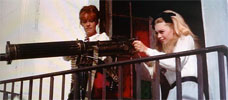
Viva Maria!
1965 -
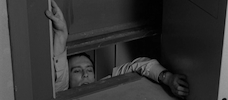
Elevator to the Gallows
1957 -
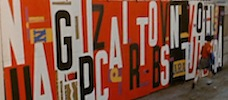
Zazie dans le métro
1960 -
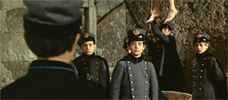
William Wilson
1968 -
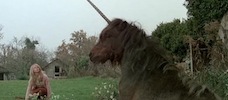
Black Moon
1975 -
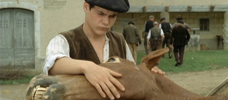
Lacombe, Lucien
1974 -
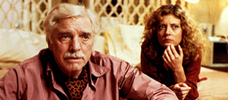
Atlantic City
1980 -
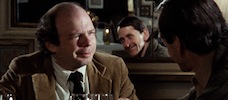
My Dinner with Andre
1981 -
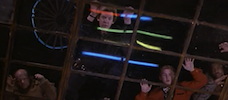
Crackers
1984 -
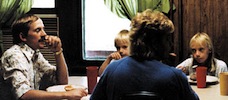
God’s Country
1985 -

Vanya on 42nd Street
1994
We don’t do comments anymore, but you may contact us here or find us on Twitter or Facebook.



